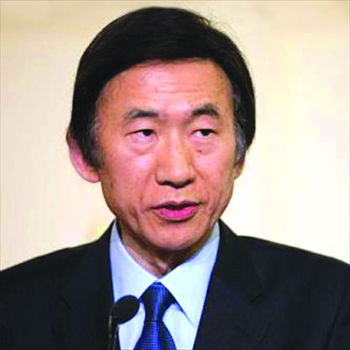South Korea, China seek peaceful peninsula

Yun Byung-se
Editor's Note:
South Korean President Park Geun-hye is visiting Beijing on June 27, her first China visit since taking office earlier this year. South Korean Foreign Minister Yun Byung-se (Yun) talked to Chinese press in Seoul shortly before the visit that is expected to advance the two countries' relationship beyond the business level and to pave the way for a nuclear-free Korean Peninsula.
Q: What are the Park administration's new guidelines in dealing with China? Are there any new moves compared with previous administrations? What does she expect to achieve in her upcoming visit to China?
Yun: "Trust diplomacy" is our new administration's key initiative. It's also the top principle in our China policies.
The second principle is understanding and respect. South Korea and China have had many differences in development, we respect and understand these differences. Also, the two should contribute to the prosperity of Asia and the world.
As for the expectations of Park's visit to China, we hope the strategic cooperative partnership can be further substantiated.
We will enhance strategic exchanges and strengthen cultural ties while further developing our trade and economy. These plans may be included in a joint statement during Park's visit, which will guide South Korea-China relations in the coming five to 20 years.
Q: China and South Korea are not as close in politics as in trade. What can be done about this?
Yun: We've been trying to push forward strategic exchanges starting with Park's visit. Through meetings of state leaders and talks at particular working levels, the cooperation will be expanded from economy to politics, national defense and foreign relations.
We will establish a comprehensive strategic exchange system. The South Korea-China relationship has come to a point where a comprehensive strategic exchange system can be built up.
During my visit to China in April, I proposed to my counterpart Wang Yi the establishment of a hotline between the two countries' foreign ministers. In June, Jeong Seung-jo, chairman of Korea's Joint Chiefs of Staff, also visited China and exchanged ideas.
During her visit to China, Park will talk with Chinese President Xi Jinping about the strategic partnership. From what we've learnt, the two countries have much common ground on the nuclear issue on the Korean Peninsula.
Q: The Korean Peninsula saw another round of tensions after Park raised the idea of a "Korean Peninsula trust process." What do you think of the current situation and China's role?
Yun: North Korea launched a missile last year, tested a nuclear bomb and shut down the Kaesong Industrial Park this year. The recent plan to resume talks between the South and the North was canceled due to various reasons. The situation now is very unstable and uncertain. To change this, the North, the South as well as China and the international community have a lot to do.
The most important thing is that the North must make the proper strategic choice and become a responsible member of the international community. The Park administration is facing many challenges. To improve the situation, we'll follow our principles while opening a window for talks.
China has been working hard in pushing for a peaceful nuclear-free peninsula through dialogue. We appreciate China's efforts to host the September 19 Joint Statement in 2005. We hope the North honors the agreement and comes back to the table of the Six-Party Talks.
We are positive about the recent summit between Chinese President Xi and US President Barack Obama, in which the two leaders made their views clear on the denuclearization of the Korean Peninsula. Based on this, we believe China will make further efforts in restarting the Six-Party Talks. We'll help the Chinese government in various ways.
Q: South Korea has recently launched a series of joint military exercises with the US. What will South Korea do to reduce Chinese people's worries over the South Korea-US military alliance?
Yun: I'm aware of such concerns. But I hope the Chinese people know why we launched these drills.
The South Korea-US military drills did not target China. Also, the drill focused on defense instead of attacks.
We don't want unnecessary tension. We'll try harder to reduce misunderstandings.
Q: Chinese President Xi and US President Obama talked about establishing a "new type of great power relationship." How does South Korea see the new relationship?
Yun: South Korea is positive about the achievements made through this meeting. The new type of ties will not only help with a constructive and peaceful relationship between China and the US, but also contribute to our regional peace and stability.
Some believe Sino-US relations are confrontational, others think they are cooperative. We believe the two are competitive in some areas, but cooperative in more areas. We maintain good relations with both countries, so a constructive Sino-US relationship will benefit South Korea, too.
Q: China and South Korea have been growing closer. But a media survey showed a not so pleasing result in their peoples' views about each other. How can this be improved?
Yun: The two governments' relationship is based on the two countries' people's feelings toward each other. It's possible that when we first established diplomatic ties, we felt good about each other, but after we know more about the other side, problems occur.
There are some unfavorable elements in the South Korea-China exchanges. However, they have not grown strong enough to affect the relationship between the two countries. To overcome this, more exchanges between the two peoples are needed. This is also one of the goals President Park is trying to achieve with this visit.